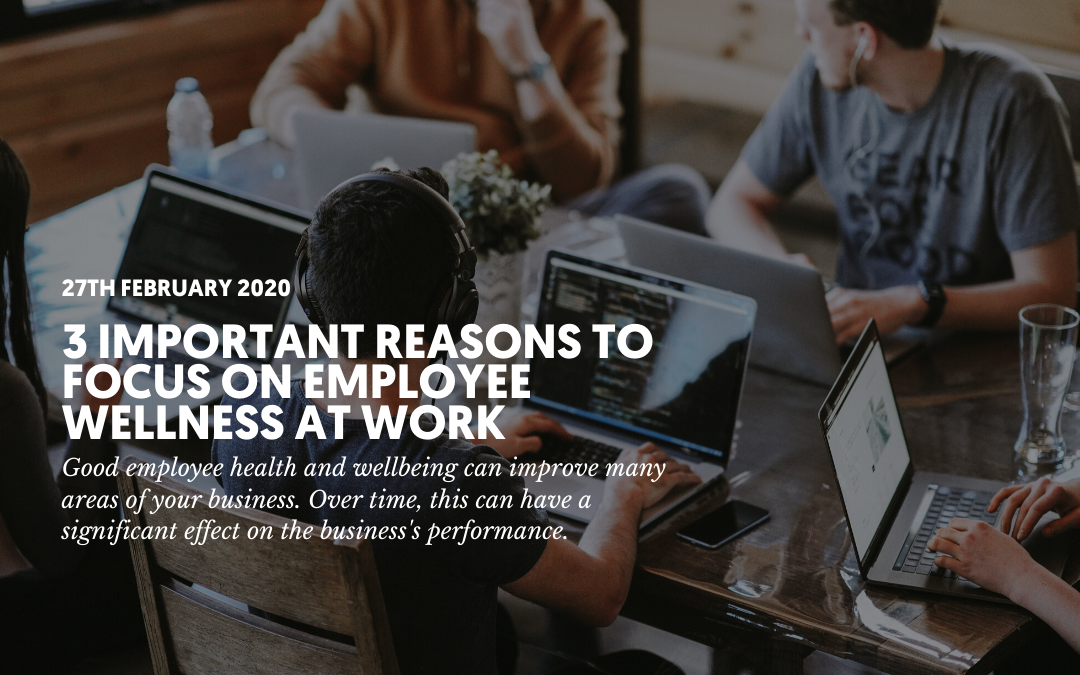To have a thriving business, you need thriving employees.
With this in mind, many businesses have begun to prioritise the health and wellbeing of their employees over the last decade by implementing employee wellbeing programmes.
Also known as a corporate wellness programme, these programmes are usually made up of a set of initiatives and can include, for example, fitness challenges, health screenings as well as mindfulness sessions. All initiatives seek to improve the overall health of a business's staff.
Important reasons to focus on employee wellness:
- You can improve staff retention
- You can positively influence the health related behaviours of your workforce to improve overall staff wellbeing
- Overall productivity within your organisation can significantly improve
Employee wellness programmes make business sense


Employee wellness should be supported from the top down, with a focus on wellbeing coming from senior management. Engagement, motivation, support and strategy are the keys to a successful employee wellbeing programme. If employees are not well, it's difficult for a business to perform at a high level. Prioritising employee wellness is no longer seen as an initiative that yields ‘soft’ results.
Instead, a focus on employee wellness at work ensures that your staff actually like and want to be in their jobs. Good employee health and wellbeing can improve many areas of your business. Over time, this can have a significant effect on the business's performance. If you are going to lead a successful business, you must invest in the wellbeing of your company’s most valuable asset: your employees.
3 important reasons to focus on employee wellness at work:
Increased staff retention
Employee wellness programmes help to support your staff to feel more fulfilled, both in their day-to-day lives and at work. When an employee is happy, engaged and enjoying their work, they’re less likely to take random ‘sick' days or look for another job. A strong link has been found between employee happiness and profitability. A study by Leadership IQ found that 46% of new employees had left their new role within 18 months, 89% of these resignations were found to be due to a poor culture fit. The study also found that turnover decreased when employees were happy, as 87% of engaged employees are less likely to leave.
High employee turnover can have many negative effects on a business. When employees decide to resign, there are multiple negative repercussions that can occur within that company. Work often does not get done, leading to missed deliverables for clients and/or other employees having to pick up the slack. The second negative impact high employee turnover has is the financial cost of hiring a new employee, with research by Oxford Economics finding that replacing members of staff incurs significant costs for employers at an average of £30,614 per employee.
Improved employee health behaviours (and overall health)


At the centre of improved employee wellness, is a focus on behaviour change. With education, motivation, and social support, people can change and adapt behaviours that impede their wellness. Corporate wellness programmes are great at helping employees to adopt and maintain healthy behaviours.
This may be the biggest benefit of focusing on employee wellness at work. Each year, UK organisations lose a median of £550+ per employee to paid sick leave, with the average employee taking 6.9 sick days annually. Healthy behaviours lead to lower health risks, and lower health risks lead to less chronic disease and acute illnesses such as the common cough or cold. A study named the Rand Report concluded: “we find that workplace well-being programmes can help contain the current epidemic of lifestyle-related diseases, the main driver of premature morbidity and mortality.” With less illness-related employee absence, and decreased sick pay leading to lower staffing costs, companies may increase their output and profitability.
Improved employee productivity
Whilst the main goal of implementing an employee wellness programme is to encourage employees down the path to a healthier lifestyle, an added bonus is that healthier employees are more likely to have a higher level of energy and increased concentration. These factors can lead to increased productivity in the workplace. Employee productivity in the workplace often translates into improved performance, including good customer service and interaction. Positive customer experience is the key to satisfying customers and clients, and many highly productive companies use this to gain customer loyalty and grow their revenue.
Being productive can help company’s increase and utilise the capacity of the human resources they have. An estimated £15.1billion is lost due to employee presenteeism in the UK annually, and a massive USD $1,500 billion is estimated to be lost globally. Decreasing presenteeism by 20%, through a focus on employee wellness improving productivity could have a big impact on your business.
Bottom line bonuses
It was once believed that promoting employee health and wellbeing didn’t add to the bottom line. However, research and the wide-ranging success of businesses who prioritise the wellbeing of their people, has shown us that this is incorrect. There is a new belief throughout many organisations today, one that acknowledges that good staff health is good for business. It is important to have those who work for you to be fit, healthy and happy. Since most people spend most of their adult life working, it’s hardly a surprise that people perform best when they are engaged and happy in their jobs. Providing your staff with value and a culture that supports – and cares about – their mental and physical health is key to getting the best work from them.
With improved business output plus increased profit the aim for corporations, and employees wanting to be happy and healthy at work; a focus on employee wellness is a win-win situation.
If you are interested in finding out more about One Year No Beer and the OYNB alcohol-free challenges, visit www.oneyearnobeer.com or email [email protected].



An entrepreneur and former senior oil broker, Ruari gave up drinking after excessive consumption almost cost him his marriage, and worse, his life. Going alcohol-free improved his relationships, career and energy levels, leading to him founding OYNB to provide a support network for others.







